violate it." Thus circumstanced, each of the thirteen States, with the exception of Rhode Island, sent delegates to Philadelphia to deliberate on the form of government which should be adopted. This deliberative assembly of a free people presented a sublime spectacle in the eyes of nations. After two years of consideration, and considerable differences of opinion, it was decided that the monarchical traditions of the Old World were effete and obsolete; and accordingly a purely Republican Constitution was promulgated, under which the United States have become a rich and powerful nation. It is gratifying to an English person to know that the Constitution of the States was derived in great measure from that of England, enlarged, and divested of those which were deemed its objectionable features. The different States had previously possessed local assemblies, and governors, and the institutions connected with slavery; the last remain to this day in pretty much the same state as when they were bequeathed by England to America. Washington entered upon the office of President in 1789, and discharged its duties, as he did those of every other station, with that high-souled and disinterested patriotismn which render him as worthy to be imitated as admired.
There are three authorities, the President, the Senate, and the House of Representatives, all elected by the people; thus their acts are to a certain extent expressive of the popular will.
The President is elected by universal suffrage, once in four years. He receives a salary of 5000l. per annum, and is assisted by five secretaries, who, with two other executive officers, are paid at the rate of 1600l. a-year.
